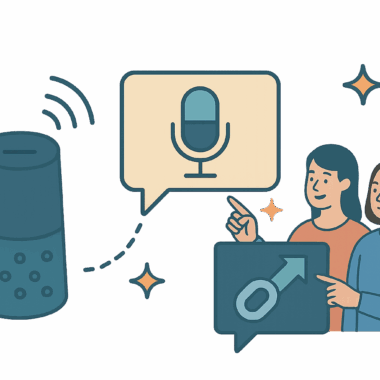

Voice Assistants & Affiliate Marketing: Is This a New Channel?

Content:
- The Growth of Voice Technology and Smart Speakers
- Understanding Voice Commerce (vCommerce)
- Potential Role of Affiliates in Voice Ecosystems
- Monetization and Commission Models for Voice
- Technical Barriers and Privacy Concerns
- Emerging Technologies and Integration Scenarios
- Conclusion
- Frequently Asked Questions (FAQ)
The rapid expansion of voice technology has created new frontiers for digital marketers. Smart speakers such as Amazon Echo, Google Home, and Apple’s HomePod are now present in over 50% of connected households in developed markets. Users rely on these devices not only for entertainment and home automation but increasingly for product discovery and shopping assistance.
This shift raises an important question: can affiliate marketing evolve to include voice-based interactions as a measurable and monetizable channel? With the global voice commerce market projected to exceed $45 billion by 2026, understanding how voice assistants influence consumer journeys is critical for forward-thinking brands and affiliates.
The Growth of Voice Technology and Smart Speakers
Over the past five years, smart speakers have transitioned from novelty gadgets to essential household devices. According to Statista, more than 320 million voice-enabled devices were in use globally by 2025, marking a 35% increase since 2020.
Consumers now use voice assistants for various functions—managing schedules, controlling smart homes, and conducting voice searches. More importantly, over 25% of users report using voice commands to research products or make purchases. This behavioral evolution positions voice interfaces as a natural extension of performance marketing ecosystems.
Key adoption factors include:
- Hands-free convenience and multitasking capabilities
- Improved accuracy of natural language processing
- Integration with e-commerce ecosystems like Amazon and Google
- Personalized responses driven by contextual data
Understanding Voice Commerce (vCommerce)
Voice commerce, or vCommerce, refers to the process of completing transactions through voice commands using AI-powered assistants. Unlike traditional e-commerce, voice shopping removes visual elements, relying instead on contextual recommendations and verbal confirmations.
This creates a unique challenge for affiliates. Instead of generating clicks, affiliates need to influence spoken recommendations, product visibility, or skill activations. It redefines user intent, where discovery, preference, and purchase are often consolidated into a single conversational exchange.
Common voice-driven interactions include:
- Reordering previously purchased products.
- Asking for product suggestions or reviews.
- Subscribing to voice-enabled services.
- Activating branded skills or voice apps.
Potential Role of Affiliates in Voice Ecosystems
For affiliates, the voice ecosystem represents a new frontier with immense but complex potential. Traditional tracking methods based on links or cookies are not applicable in voice interactions, which occur within closed environments owned by platforms like Amazon or Google.
However, opportunities exist through voice-based recommendations, API integrations, and partnerships within branded skills. Affiliates can collaborate with developers or merchants to create voice experiences that guide users to specific products or services. Success in this channel will depend on early experimentation, adaptability, and strategic cooperation with voice technology providers.
Monetization and Commission Models for Voice
Since voice-driven commerce eliminates visual and clickable interfaces, monetization models must evolve. Affiliates can earn commissions based on voice-triggered actions or conversions tied to authenticated accounts.
Possible monetization frameworks include:
- Voice search placement fees – brands pay for prioritized placement in voice search results.
- Conversion-based voice referrals – tracking purchases linked to specific voice interactions.
- Skill activation bonuses – payments for promoting branded skills or actions.
- Subscription rewards – recurring commissions for voice-based app activations.
Developers and brands can enable this through platform APIs that link user IDs with conversion events. Although still in early stages, these systems promise accurate attribution without violating privacy regulations.
|
Model Type |
Description |
Best Use Case |
| Voice Referral | Commissions based on spoken recommendations or purchase triggers. | Retail and FMCG sectors |
| Skill Activation | Rewards for encouraging users to install or engage with a voice skill. | Digital services and education |
| Subscription Conversion | Recurring payments tied to long-term voice-driven subscriptions. | Streaming and SaaS models |
Technical Barriers and Privacy Concerns
Despite its promise, the voice ecosystem poses significant technical and ethical challenges. Attribution remains the biggest obstacle since most smart speaker environments do not allow third-party tracking or link-based analytics.
Additionally, voice data is classified as highly sensitive under privacy frameworks like GDPR. Marketers must adhere to strict consent protocols and ensure anonymized processing of audio inputs. Partnerships with certified technology providers and transparent user communication are critical for maintaining compliance.
Primary challenges include:
- Limited tracking infrastructure in closed ecosystems
- Inconsistent attribution across devices
- Privacy and data retention restrictions
- Dependence on platform-level API access
Emerging Technologies and Integration Scenarios
As voice commerce matures, new technologies are emerging to bridge the gap between conversation and conversion. AI-driven speech-to-intent analytics and voice behavior modeling help brands understand user intent without invasive data collection.
Moreover, voice search optimization (VSEO) is becoming an essential component of affiliate strategy. Optimizing product descriptions, brand names, and conversational keywords ensures better placement in voice search results. Platforms like Amazon Alexa and Google Assistant are expected to introduce monetization APIs that integrate affiliate tracking in the coming years.
Emerging technologies driving this change:
- Voice analytics dashboards
- AI-based intent prediction engines
- Contextual advertising APIs
- Voice-activated loyalty programs
Conclusion
The intersection of voice technology and affiliate marketing is still in its infancy, but it represents one of the most promising frontiers in digital performance marketing. While technical and privacy barriers exist, innovation is steadily transforming voice into a measurable channel.
Forward-thinking brands that experiment with voice integrations today—through VSEO, skill partnerships, and ethical data analytics—will gain an early competitive advantage. As user behavior continues to shift toward conversational interactions, affiliates who adapt their strategies accordingly will lead the next wave of digital commerce innovation.
Frequently Asked Questions (FAQ)
1. What is voice commerce, and how does it differ from e-commerce?
Voice commerce allows users to complete transactions via spoken commands rather than visual browsing. It simplifies purchase journeys but reduces visual discovery opportunities.
2. How can affiliate marketers track voice-based sales?
Through server-side integrations and API connections linking voice interactions with verified user accounts or purchase data.
3. Are any brands already monetizing through voice assistants?
Yes, Amazon and Spotify have begun experimenting with voice-triggered offers and partner integrations for selected campaigns.
4. What are the main barriers to affiliate marketing in voice ecosystems?
Attribution, lack of standardized APIs, and user privacy constraints remain significant obstacles to full-scale adoption.
5. How can marketers prepare for voice-driven commerce?
By optimizing for VSEO, building relationships with voice platform developers, and experimenting with conversational content strategies.

Affiliate Marketing Without Cookies: How to Future-Proof Your Program
The gradual elimination of third-party cookies is transforming the foundation of digital marketing. As major browsers phase out traditional tracking mechanisms and global privacy regulations tighten, affiliate marketing programs are forced to innovate. The cookieless future is not a theoretical concept—it is an active shift that demands adaptation to protect accuracy, compliance, and profitability.

Comparison of the Top 15 Affiliate Software Solutions for the iGaming Industry
This article evaluates 15 top-tier affiliate platforms, offering insights into their architecture, feature sets, and pricing transparency. The goal is to guide iGaming operators—whether startups or established brands—toward data-driven decisions. Tools such as a casino affiliate software or gambling affiliate marketing software can provide the performance analytics operators need.

Regulatory Compliance for iGaming Affiliate Programs: What You Must Know
This article defines the critical areas every operator and publisher must master: jurisdiction scoping, licensing duties, marketing and advertising standards, data privacy and consent, KYC/AML with responsible gambling, transparent affiliate tracking disclosures and de-duplication, and contractually enforced governance. Each section outlines concrete checkpoints and measurable outputs so legal, marketing, and BI teams can align on a single source of truth.



